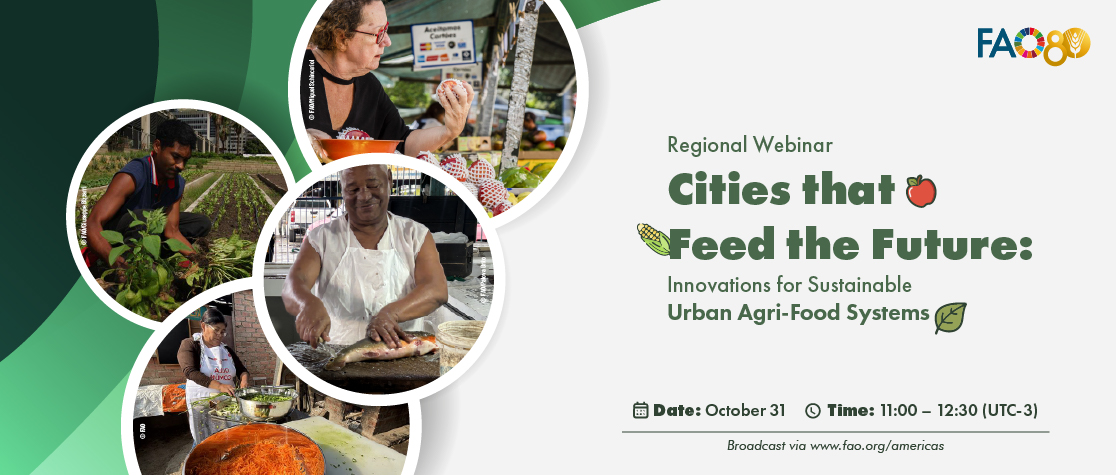Cities that Feed the Future: Innovations for Sustainable Urban Agrifood Systems
Hybrid Event, 31/10/2025

Live broadcast
Context
In 2024, ECLAC estimated that the population of Latin America reached 663 million people, within a global trend of demographic growth and urbanization. This context highlights the urgency of analyzing and addressing the challenges and opportunities faced by agrifood systems to ensure access to healthy food through more efficient, resilient, and environmentally sustainable production, distribution, and consumption processes.
The transformation of food systems across the urban–rural continuum is key to addressing the challenges of food security, environmental sustainability, and inclusive development. According to The State of Food Security and Nutrition in the World (SOFI) 2025 report, in 2024 hunger affected 5.1% of the population of Latin America and the Caribbean — equivalent to 34 million people. Although this represents a decrease compared to previous years — when in 2020 undernourishment peaked at 6.1% — moderate or severe food insecurity remains a major challenge. These figures underscore the need to strengthen policies and strategies that ensure healthy and sustainable diets, while addressing inequalities in food access and the territorial dynamics influencing production, distribution, consumption, and post-consumption.
Given this scenario, it is essential to promote innovations in agrifood systems that lead to more sustainable production, incorporating efficient technologies and practices such as agroecology and regenerative agriculture. It is also necessary to advance the modernization of traditional food marketing and distribution channels, integrating approaches related to circular economy, logistical efficiency, and digitalization. Furthermore, initiatives focused on food education, effective access to healthy food, and urban agriculture must be encouraged, along with reforms in the regulatory and governance frameworks of the food agenda, strengthening citizen participation and multi-stakeholder platforms.
World Cities Day
In 2014, the United Nations General Assembly designated October 31 as World Cities Day with the aim of promoting interest in urbanization and fostering cooperation among countries to harness opportunities and address the challenges posed by urbanization, as well as to contribute to sustainable urban development worldwide.
In this context, the Brazil–FAO International Cooperation Programme, through the regional project Urban Agrifood Systems, will hold a regional webinar on October 31 to facilitate the exchange of innovations and successful experiences that are advancing the urban food agenda in Latin America and the Caribbean.
Objective
To present innovative experiences and strategic frameworks to promote the sustainable transformation of urban agrifood systems, highlighting their contribution to food security, environmental sustainability, and territorial resilience. The event also aims to showcase successful cases from countries with potential for scaling up across the region.
Participants
The event is aimed at authorities, technical experts, and decision-makers from local, subnational, and national governments; civil society; universities; the private sector; and international organizations involved in agrifood systems and the urban agenda.
Speakers
- Patricia Gentil, Director of the Department for the Promotion of Adequate and Healthy Diets – National Secretariat for Food and Nutrition Security (SESAN), Ministry of Social Development and Assistance, Family, and the Fight against Hunger (MDS).
- Cecilia Malaguti do Prado, General Coordinator for Triangular South–South Cooperation, Brazilian Cooperation Agency – ABC/MRE.
- João Intini, FAO Food Systems and Policy Officer.
- Isis Nunez Ferrera, Urban Agri-Food Systems Coordinator, Agri-Food Systems and Food Security Division, FAO.
- Luiz Carlos Beduschi, Senior Policy Officer, Territorial Development. Better Environment, Better Life Coordinator, FAO.
- Representative of LUPPA cities – Osasco, Brazil.
- Representative of the Ministries of Economy, Development, and Tourism (MINECON), Chile.
- Representatives of FAO and ASOFALIPRE; Municipality of Manizales, Colombia.
- Representative of the Network of Community Kitchens of Pachacámac (REDOPA), Peru.
- Representative of the Municipality of Curridabat, Costa Rica.
- Representative of the United Nations Children’s Fund (UNICEF).
- Representative of the Urban Food Policy Lab (LUPPA).
- Representative of the Network of Intermediate Cities and Agrifood Systems (Red CISA).
Related News
América Latina impulsa iniciativas de ciudades verdes y sostenibles
Contact
General Coordinator of the Urban Agrifood Systems Project
FAO Regional Office for Latin America and the Caribbean
Senior Policy and Food Systems Officer, FAO.
FAO Regional Office for Latin America and the Caribbean
